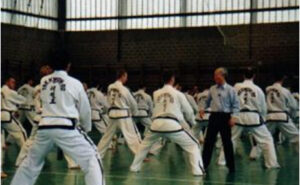
Historical revisionism becomes imperative to understand the reality that surrounds us. The only source of real training for more than half of Taekwon-Do’s existence and founded by General Choi Hong Hi was the Instructor.
This direct relationship avoided to feed doubts and sustain a vertical martial system without double speeches. From the literary point of view, the appearance of the book published by the Founder of the discipline contributed to corroborate the information received from the Instructor. Many students were left with only what they received from the instructor and did not consult the literature.
The appearance of national and international championships allowed an exchange of experiences with different teaching methodologies at a global level that modified over time the previous system used. However, it should be clarified that even so all pedagogical systems had a strong dependence on the martial art and its foundation in self-defense.
The main difference consisted in the interpretation given to the techniques that were included in patterns (tul). At that time and due the non-proliferation of high grades only 15 or 16 were taught. Although the development of these was subject to the unique guide that feeds the 24 patterns, the most advanced were not executed due to the lack of degrees that demanded their development. The international sports confrontation brought with it a discrepancy in the biomechanics of the movements executed in patterns’ competition, putting the system on alert about which was the right way to perform them.
The word of the direct Instructor began to find questions that could hardly be answered due to a criterion that presented certain differences at the international level. General Choi, who at that time had to solve the systematic usurpation of his art, had to explain the biomechanical discrepancy existing in international events. He entrusted on several occasions to Korean Masters in the task of combining reasons in the countries members to achieve unification of technical interpretation. While this helped in certain respects, on many occasions it also contributed to increasing the diversity of criteria. In these circumstances we reached to the end of the 80’s
This reality brought with it the increasingly need to unify an interpretation about the biomechanical criteria to be globally used without double definitions. It is evident that the only person for such a task was the founder of the discipline himself, who began to develop Taekwon-Do seminars in no uncertain terms. His 15-volume Encyclopedia, which photographically detailed the execution of the movements, helped to support the task.
According to dictionary, a seminar is a class or session where the source of knowledge or highest authority of the subject deal with the disciples meets, to carry out a research work or unify criteria on a certain topic. In the case at hand, General Choi instructed on the correct execution of each technique that make up the Art founded by him, many of which are included in the 24 patterns that compose it. The detailed development of each of the movements allowed during the 90’s to clear doubts worldwide about the correct execution and practical usefulness of these, making more equitable competition between the countries that made up the international entity presided by him.
At no time did General Choi spoke about the sporting facet and less about how to carry out the combative aspect. The tactical and strategic spectrum that feeds this facet is so broad that teaching classes on the subject was considered by the Founder himself as a lack of experience. He thought that it doesn’t contribute to the students or teachers evolution. He proposed that each teaching place dictates it own system, whose concepts should be individual indications and not general terms as usually is wrongly doing because each person is different.
Until the unification of technical criteria in hands of General Choi that were called seminars due to the direct pedagogical relationship with the highest authority in the subject, what was given by the other Korean instructors delegated by him, were cataloged as special training courses. This concept is also valid today in the face of the proliferation of a teaching staff from different nationalities and grades.
To be called seminar, the source of information must be the top of the subject to avoid any doubt about its interpretation. In an institution seriously constituted, a single voice elected and agreed upon by the Council of Masters may dictate seminars. In this context, giving seminars without holding the highest degree of information or without exercising as the technical authority is simply a daring of hierarchies that have not understood the place they occupy. Degree and knowledge should go hand in hand, but at present this is not the case. These high grades give only one training class where they talk about kicking and punching in a sport confrontation.
All meetings dealing with the combative aspects, not advised by the founder himself, have the character of special classes only. But of course, it is very difficult to collect the cost that can be asked for a seminar when what is giving is only a training class.
SGM Ricardo Desimone
To be aware read again the previous notes